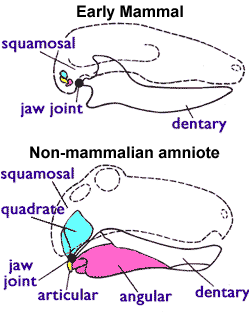Thearticular boneis part of the lower jaw of mostvertebrates,including mostjawed fish,amphibians,birdsand various kinds ofreptiles,as well as ancestralmammals.

Anatomy
editIn most vertebrates, the articular bone is connected to two other lower jaw bones, thesuprangularand theangular.[1]Developmentally, it originates from the embryonic mandibular cartilage. The mostcaudalportion of the mandibular cartilage ossifies to form the articular bone, while the remainder of the mandibular cartilage either remains cartilaginous or disappears.[1]
In snakes
editInsnakes,the articular, surangular, and prearticular bones have fused to form the compound bone. The mandible is suspended from the quadrate bone and articulates at this compound bone.[2]
Function
editIn amphibians and reptiles
editIn most tetrapods, the articular bone forms the lower portion of the jaw joint. The upper jaw articulates at thequadrate bone.[3]
In mammals
editInmammals,the articular bone evolves to form themalleus,one of the mammalianossiclesof the middle ear. This is anapomorphyof the mammalian clade,[4]and is used to determine the fossil transition to mammals.[5]It isanalogousto, but nothomologousto thearticular processof thelower jaw.
After the loss of the quadrate-articular joint, the squamosal and dentary bones form the new jaw joint in mammals.[6]
See also
editReferences
edit- ^abHomberger, Dominique G. (2004).Vertebrate dissection.Walker, Warren F. (Warren Franklin), Walker, Warren F. (Warren Franklin). (9th ed.). Belmont, CA: Thomson Brooks/Cole.ISBN0-03-022522-1.OCLC53074665.
- ^Kardong, Kenneth V. (2012).Vertebrates: comparative anatomy, function, evolution(6th ed.). New York: McGraw-Hill.ISBN978-0-07-352423-8.OCLC664665896.
- ^"University of the Cumberlands, QUADRATE AND ARTICULAR EXPRESSION".Archived fromthe originalon 2017-05-17.Retrieved2016-07-16.
- ^"Mammaliformes: Overview - Palaeos".Archived fromthe originalon 2007-04-29.
- ^Kardong, Kenneth V. (2012).Vertebrates: comparative anatomy, function, evolution(6th ed.). New York: McGraw-Hill.ISBN978-0-07-352423-8.OCLC664665896.
- ^Kermack, D. M. (1984).The evolution of mammalian characters.Kermack, K. A. London: Croom Helm.ISBN0-7099-1534-9.OCLC10710687.